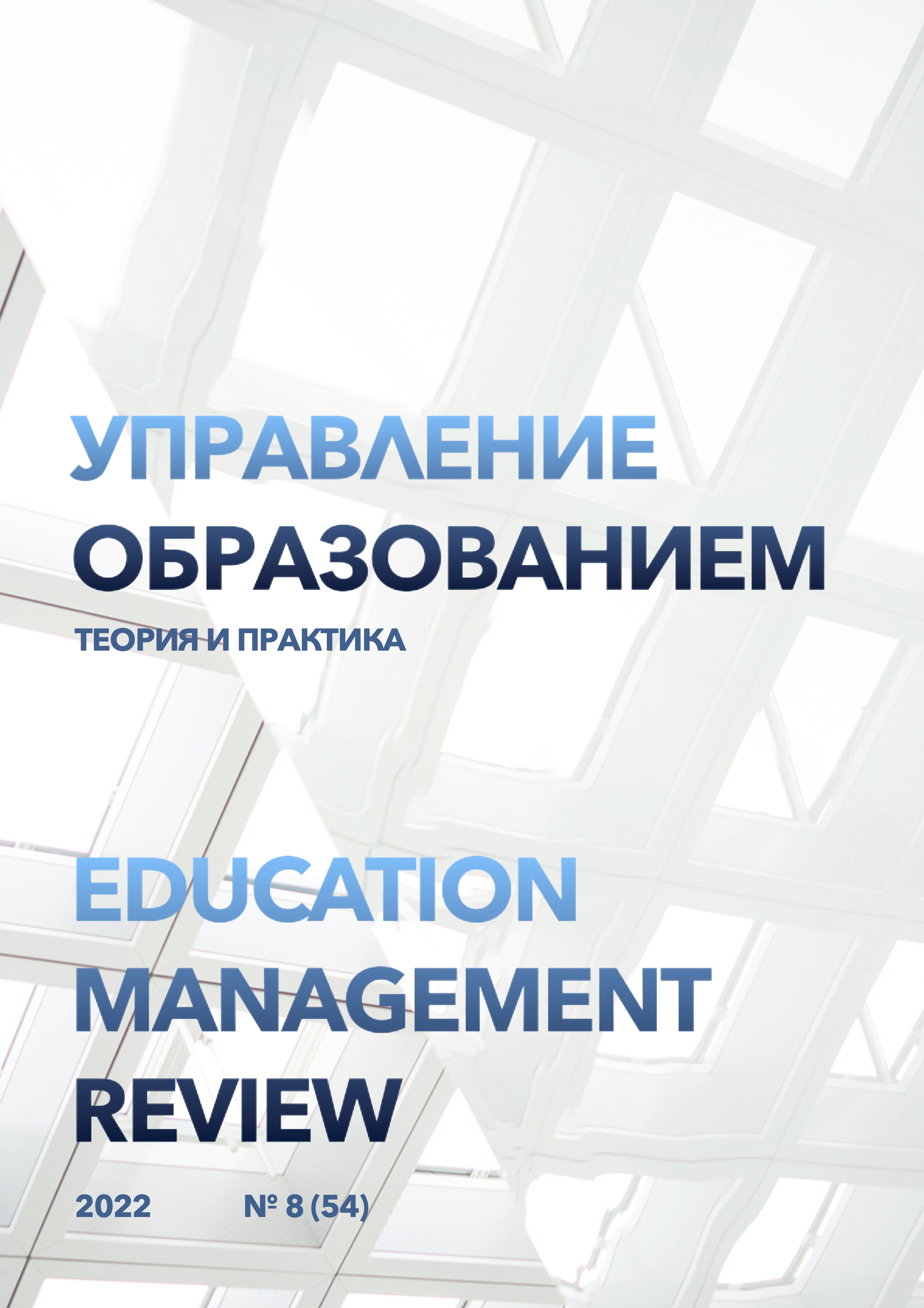Formalization of the use of coaching methods in the design of educational trajectories of teachers' career growth
DOI:
https://doi.org/10.25726/l0756-0956-8016-cKeywords:
career, growth, trajectory, coaching, methodologyAbstract
Coaching methods are aimed at motivation in achieving career or social functions that were previously inaccessible to an individual. At the same time, coaching acts only as an additional form of career development for people engaged in a certain professional activity. The possibilities of its expansion are also consistent only if the goals that are laid down at the beginning of professional development and professional self-realization are achieved. The novelty of the research is determined by the need to apply coaching methods and corrective measures not only during the active implementation of a career, but also during its interruption. The authors show that career development opportunities should be based on the willingness of the individual who plans to realize his career aspirations. The article shows that the possibility of developing a career trajectory is based on psychological readiness and, if necessary, on the correction of such readiness by psychological methods. The practical significance of the study is determined by the willingness to implement the choice of a career path through the use of stimulating or correctional types only. This allows the team to increase overall productivity and reduce possible problems in the implementation of major strategic projects.
References
Ahmed, W. (2018). Developmental trajectories of math anxiety during adolescence: Associations with STEM career choice. Journal of Adolescence, 67, 158–166. https://doi.org/10.1016/j.adolescence.2018.06.010
Barsegyan, V. M. (2019). Models of career trajectories of the heads of Russian Regions. Polis (Russian Federation), 2019(4), 132–148. https://doi.org/10.17976/jpps/2019.04.10
Berdanier, C. G. P., & Zerbe, E. (2019). Correlations between graduate student writing concepts and processes and certainty of career trajectories. In Proceedings - Frontiers in Education Conference, FIE (Vol. 2018-October). https://doi.org/10.1109/FIE.2018.8658678
Davis, C., Baty, B. J., Hippman, C., Trepanier, A., & Erby, L. (2019). Genetic counselors with advanced skills: II. A new career trajectory framework. Journal of Genetic Counseling. https://doi.org/10.1002/jgc4.1204
Duarte, K., Weber, R. O., & Pacheco, R. C. S. (2016). Case-based comparison of career trajectories. In CEUR Workshop Proceedings (Vol. 1815, pp. 152–161).
Fournier, G., Zimmermann, H., & Gauthier, C. (2011). Instable career paths among workers 45 and over: Insight gained from long-term career trajectories. Journal of Aging Studies, 25(3), 316–327. https://doi.org/10.1016/j.jaging.2010.11.003
Green, A., & Ridenour, N. (2004). Shaping a career trajectory in academic administration: Leadership development for the deanship. Journal of Nursing Education, 43(11), 489–495. https://doi.org/10.3928/01484834-20041101-04
Gubler, M., Biemann, T., Tschopp, C., & Grote, G. (2015). How Career Anchors Differentiate Managerial Career Trajectories: A Sequence Analysis Perspective. Journal of Career Development, 42(5), 412–430. https://doi.org/10.1177/0894845315572891
Heimburger, D. C., Carothers, C. L., Blevins, M., Warner, T. L., & Vermund, S. H. (2015). Impact of global health research training on career trajectories: The fogarty international clinical research scholars and fellows program. American Journal of Tropical Medicine and Hygiene, 93(3), 655–661. https://doi.org/10.4269/ajtmh.14-0705
Henderson, M., & Chetkovich, C. (2014). Sectors and Skills: Career Trajectories and Training Needs of MPP Students. Journal of Public Affairs Education, 20(2), 193–216. https://doi.org/10.1080/15236803.2014.12001782
Hosein, A., & Rao, N. (2017). Pre-professional ideologies and career trajectories of the allied professional undergraduate student. Research in Post-Compulsory Education, 22(2), 252–270. https://doi.org/10.1080/13596748.2017.1314683
Kim, K.-N. (2013). Career trajectory in high school dropouts. Social Science Journal, 50(3), 306–312. https://doi.org/10.1016/j.soscij.2013.03.005
Li, L., Zheng, G., Peltsverger, S., & Zhang, C. (2016). Career trajectory analysis of Information Technology Alumni: A linked in perspective. In SIGITE 2016 - Proceedings of the 17th Annual Conference on Information Technology Education (pp. 2–6). https://doi.org/10.1145/2978192.2978221
Miwa, S. (2008). Trends in Inequality of Career Trajectory in Japan. Sociological Theory and Methods, 23(2), 23–40.
Norris-Tirrell, D., Rinella, J., & Pham, X. (2018). Examining the Career Trajectories of Nonprofit Executive Leaders. Nonprofit and Voluntary Sector Quarterly, 47(1), 146–164. https://doi.org/10.1177/0899764017722023
Rajecki, D. W., & Borden, V. M. H. (2011). Psychology degrees: Employment, wage, and career trajectory consequences. Perspectives on Psychological Science, 6(4), 321–335. https://doi.org/10.1177/1745691611412385
Stein, M. (1994). Leaving Care, Education and Career Trajectories. Oxford Review of Education, 20(3), 349–350. https://doi.org/10.1080/0305498940200308
Wu, K., Tang, J., & Zhang, C. (2018). Where have you been? Inferring career trajectory from academic social network. In IJCAI International Joint Conference on Artificial Intelligence (Vol. 2018-July, pp. 3592–3598). https://doi.org/10.24963/ijcai.2018/499
Xu, H., Yu, Z., Guo, B., Teng, M., & Xiong, H. (2018). Extracting job title hierarchy from career trajectories: A Bayesian perspective. In IJCAI International Joint Conference on Artificial Intelligence (Vol. 2018- July, pp. 3599–3605). https://doi.org/10.24963/ijcai.2018/500
Xu, Y., Li, Z., Gupta, A., Bugdayci, A., & Bhasin, A. (2014). Modeling professional similarity by mining professional career trajectories. In Proceedings of the ACM SIGKDD International Conference on Knowledge Discovery and Data Mining (pp. 1945–1954). https://doi.org/10.1145/2623330.2623368




